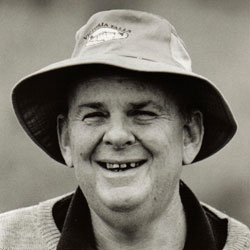Sprawl is the quality
of the man who cut down his Rolls-Royce
into a farm utility truck, and sprawl
is what the company lacked when it made repeated efforts
to buy the vehicle back and repair its image.
Sprawl is doing your farming by aeroplane, roughly,
or driving a hitchhiker that extra hundred miles home.
It is the rococo of being your own still centre.
It is never lighting cigars with ten-dollar notes:
that’s idiot ostentation and murder of starving people.
Nor can it be bought with the ash of million-dollar deeds.
Sprawl lengthens the legs; it trains greyhounds on liver and beer.
Sprawl almost never says Why not? with palms comically raised
nor can it be dressed for, not even in running shoes worn
with mink and a nose ring. THat is Society. That’s Style.
Sprawl is more like the thirteenth banana in a dozen
or anyway the fourteenth.
Sprawl is Hank Stamper in Never Give an Inch
bisecting an obstructive official’s desk with a chainsaw.
Not harming the official. Sprawl is never brutal
though it’s often intransigent. Sprawl is never Simon de Montfort
at a town-storming: Kill them all! God will know his own.
Knowing the man’s name this was said to might be sprawl.
Sprawl occurs in art. THe fifteenth to twenty-first
lines in a sonnet, for example. And in certain paintings;
I have sprawl enough to have forgotten which paintings.
Turner’s glorious Burning of the Houses of Parliament
comes to mind, a doubling bannered triumph of sprawl –
except, he didn’t fire them.
Sprawl gets up the nose of many kinds of people
(every kind that comes in kinds) whose futures don’t include it.
Some decry it as criminal presumption, silken-robed Pope Alexander
dividing the new world between Spain and Portugal.
If he smiled in petto afterwards, perhaps the thing did have sprawl.
Sprawl is really classless, though. It’s John Christopher Frederick Murray
asleep in his neighbours’ best bed in spurs and oilskins
but not having thrown up;
sprawl is never Calum who, drunk, along the hallways of our house,
reinvented the Festoon. Rather
it’s Beatrice Miles going twelve hundred ditto in a taxi,
No Lewd Advances, No Hitting Animals, No Speeding,
on the proceeds of her two-bob-a-sonnet Shakespeare readings.
An image of my country. And would that it were more so.
No, sprawl is full-gloss murals on a council-house wall.
Sprawl leans on things. It is loose-limbed in its mind.
Reprimanded and dismissed
it listens with a grin and one boot up on the rail
of possibility. It may have to leave the Earth.
Being roughly Christian, it scratches the other cheek
and thinks it unlikely. Though people have been shot for sprawl.
Notes on the Poem
Let's enjoy and consider again one of our very first Poems of the Week, Les Murray's "The Quality of Sprawl" from his collection "Learning Human". Those objects, landscapes and behaviours that Les Murray suggests exemplify the quality of sprawl might seem disarmingly expansive and deceptively languid at first, such as: “… doing your farming by aeroplane, roughly, or driving a hitchhiker that extra hundred miles home.” While sprawl seems synonymous with “easygoing” and “generous”, Murray lets us know in good order that it can be inspired to act at the first hint of bureaucratic indifference or injustice, as the unharmed but likely nervous official with the desk halved by a chainsaw learned quickly enough. Murray reassures us (and we can hear it expressed with a sly drawl): “Sprawl is never brutal though it’s often intransigent.” Murray vividly incorporates the figure of Beatrice Miles – described in the Australian Dictionary of Biography as a “Bohemian rebel … notable for her outrageous, disruptive conduct in public places, and her outspoken criticism of political and social authorities” - to embody sprawl’s colourful spirit. Is there an air of menace to “The Quality of Sprawl”? The last line would suggest that the threat is more to those who insouciantly wield sprawl than to those who dismiss, disregard or actively oppose it. More likely, while sprawl “may have to leave the Earth”, one suspects it will still be looking on with “one boot up on the rail of possibility”, quietly but unflinchingly gazing at the arbitrary, the hypocritical and the cruel.
